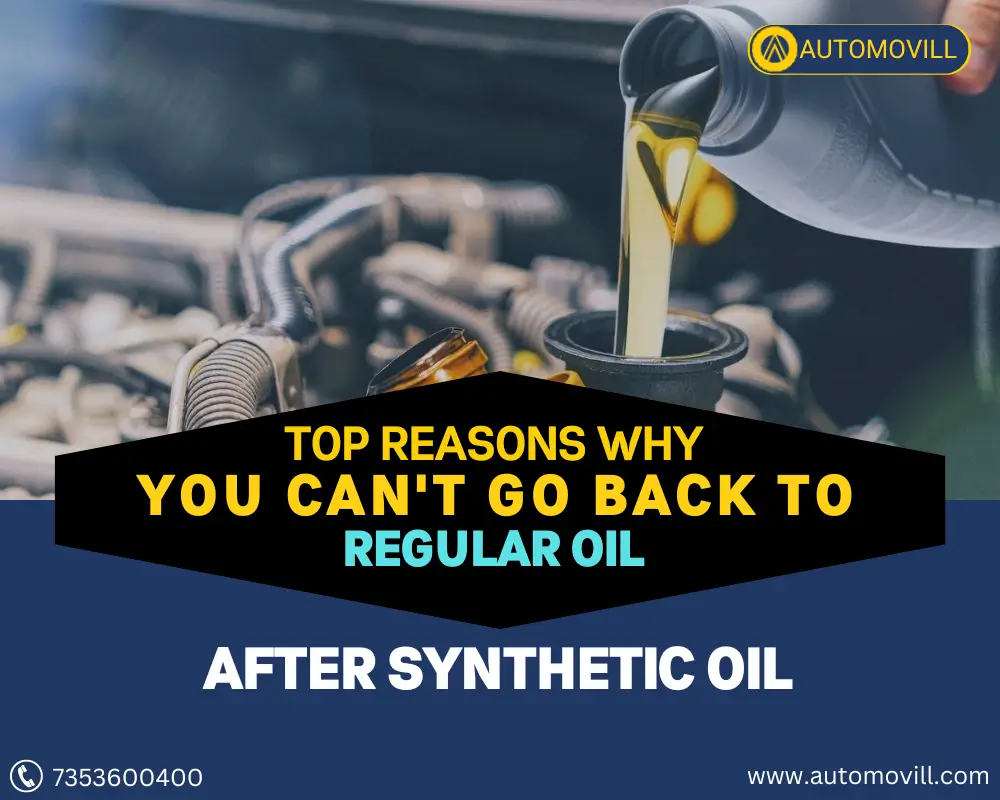
Once you go to synthetic oil, there is no turning back. By nature, synthetic oil is far slick than regular oil, which means that it can result in leaks in a conventional engine (which are dangerous and expensive).
This is because synthetic oil has additives that make it more slippery than regular oil, which could lead to leaks in older vehicles.
Even if you have an older automobile, once you switch to synthetic oils, you won’t be able to switch back because synthetic oils are also designed to resist degradation better than conventional oils.
The way you drive should also be taken into account while deciding whether or not to use synthetic oil.
Synthetic would probably be best for your automobile if you do a lot of stop-and-go driving or city driving in general (which generates a lot of heat from friction); if most of your travel takes place on the interstate and entails long trips, conventional would be adequate for your needs.
Mixing synthetic and conventional oil is not recommended by manufacturers
One reason is that the producers of engine and automobile oils do not advise combining synthetic and conventional oils. Because synthetic oils are designed to perform better, offer more durable protection, and be more resistant than conventional lubricants, this is the case.
However, this does not necessarily imply that they are better for your car. In fact, using a partially synthetic or even fully synthetic oil will actually help restore some of the elasticity to the seals in your engine if you have an older car with high mileage where the seals may have already leaked and lost their original elasticity.
It’s crucial to think about how removing all of the old oil from your car may affect your long-term costs if you choose not to blend synthetic and conventional oil.
For instance, conventional motor oils are less expensive than synthetic ones, and you won’t be able to reuse your old oil pan if any of the old oil remains in it.
Synthetic oil is engineered to perform better, but that doesn’t mean it’s better for your car
Despite the fact that synthetic oil is designed to perform better than regular oil, your car may not always benefit from using it. It may be a good idea to move from synthetic to conventional oil for a number of reasons:
- Synthetic oils are made to tolerate higher temperatures and keep your engine free of deposits. However, if the typical temperature in your region is below 70 degrees Fahrenheit or if your daily commute doesn’t involve a lot of stop-and-go traffic, you can probably get away with using regular motor oil. Even though you’ll still need to replace it after 3,000 miles or so, it should be plenty to keep your engine in good working order.
- The price can affect the type of oil you use for your car. If money is tight, using standard motor oil will save you money. It’s not as effective as its synthetic counterpart at cutting emissions and improving fuel efficiency, but if you’re looking for a solution that will simply keep everything running without costing the earth, this is it!
Synthetic and Conventional Oils Should Not be Mixed?
- When changing your oil, we used to believe that combining traditional and synthetic oil was safe. We believe that following the initial swap, you may use any sort of oil you prefer when filling up again. After all, how different could these oils possibly be, we reasoned?
- They are, in fact, very dissimilar. In fact, combining synthetic and conventional oils will result in a mismatch between the two oils’ physical characteristics, which will alter how they interact with one another when heated. The mixture will break down, as a result, performing poorly in your car and failing to safeguard your engine.
Should You Switch Between The Two?
If the car is brand new, switching back to traditional engine oil after upgrading to synthetic engine oil might not be a major concern. You can still experience a decline in performance.
If you want to transition between the two, we advise against doing so immediately. Instead, switch to ordinary engine oil after using semi-synthetic oil once so that you don’t notice an abrupt difference in performance. However, we advise against using synthetic engine oil for older automobiles.
Synthetic oil goes through a different refinement process than conventional oil. Synthetic oil has very homogeneous molecules as opposed to conventional oil, which has molecules of various sizes.
The fact that synthetic oil flows more swiftly and maintains a lower temperature than regular oil is one of its advantages.
While switching between synthetic and conventional oil can be done without causing any harm, in my opinion, synthetic oil has more benefits than drawbacks. Make sure you never go back to using conventional oil after using synthetic oil.
There are a lot of benefits to using synthetic oil. Some of them are listed below.
Benefits of Synthetic Oil
Oil containing additives and chemical compounding is known as synthetic oil. It is made in a lab or factory using different chemical mixtures. As a result, there are many kinds of synthetic oils depending on the environment and usage.
These are far more expensive than conventional oils because they are specifically created for a variety of situations and functions. The advantages of synthetic oil are listed below.
- Extreme temperatures don’t affect synthetic oil’s ability to function. Even if it gets too hot, there won’t be any friction between the engine’s parts and there will be enough lubrication.
- You don’t have to worry about your engine oil freezing in frigid temperatures because it may remain liquid for a shorter temperature range.
- The viscosity Index of lubrication oil and temperature can both be adjusted to accommodate different temperature circumstances.
- Compared to normal oil, less hazardous deposits are formed.
- Compared to ordinary oil, the time between oil replacements is longer.
